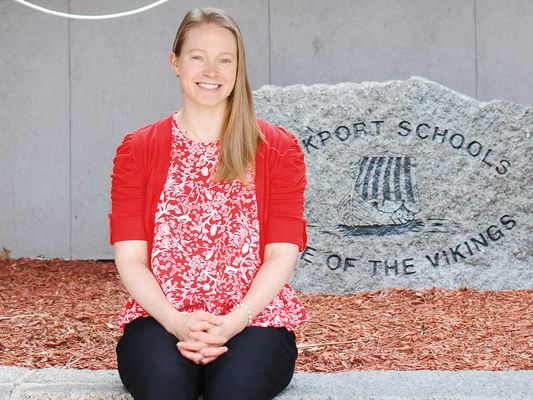- Undergraduate
Bachelor's Degrees
Bachelor of ArtsBachelor of EngineeringDual-Degree ProgramUndergraduate AdmissionsUndergraduate Experience
- Graduate
Graduate Experience
- Research
- Entrepreneurship
- Community
- About
-
Search
All Thayer News

On the Job: Alexandria (Fecych) Favazza
Mar 15, 2021 | by Theresa D’Orsi | Dartmouth Engineer

ALEXANDRIA (FECYCH) FAZAZZA ’07
Favazza’s greatest lesson from nine years of teaching STEM topics: A child’s developmental readiness is the biggest factor in his or her learning success. “Some kids will understand a new idea the first time they hear it, while others might hear it every year for a decade and not understand it until the 11th year,” says the Rockport (Mass.) Middle School math teacher. “You just keep giving them opportunities to succeed and keep reminding them that failures are actually an important part of learning.”
What prompted you to shift from practicing science and math to teaching it?
I worked in a research lab at MIT with a fantastic group of graduate-level students and fell into an advisory role on a lot of the practical aspects of designing and conducting experiments and processing data. This happened when a huge contingent of my extended family was of adolescent age, and I realized I wanted to be doing similar work with younger students, particularly during the turbulent middle school years and especially with girls.
Are there favorite concepts?
They really love learning Cartesian coordinates because they’re so visual and the statistics because they start to understand some of the concepts they’ve heard about for years. I love the projects that are completely engineering (like Rube Goldberg) and projects where they need to create a plan, and then I swap their work and they need to execute someone else’s work.
"“I wanted to grow an army of nerd girls.”"
Alexandria (Fecych) Favazza ’07
How have you adapted to a remote classroom?
We have come a long way since March. The toughest part throughout this pandemic has been accountability and student engagement. I try to use relevant and interesting problems that they have some knowledge or experience with—such as baking or other food—or make it silly but approachable—such as, “If you spent the whole school day walking instead of doing school, how far would you walk and where could you go?” I’ve got a whiteboard and a webcam at my house and I’m lucky to have mostly students who want to do well and will persevere through any challenge. They’re 11 or 12; they all want to connect but they don’t always know how yet or remember the importance of sticking with it in the moment!
For contacts and other media information visit our Media Resources page.
